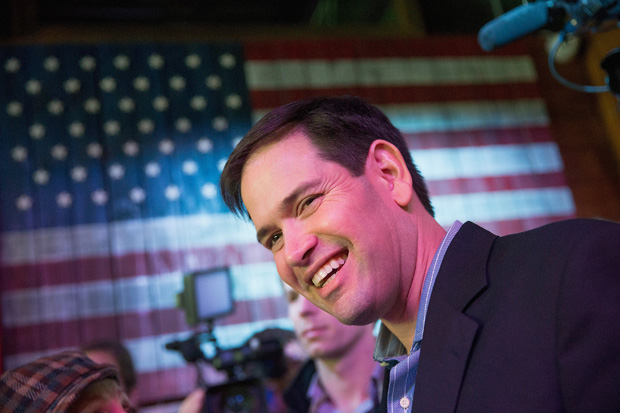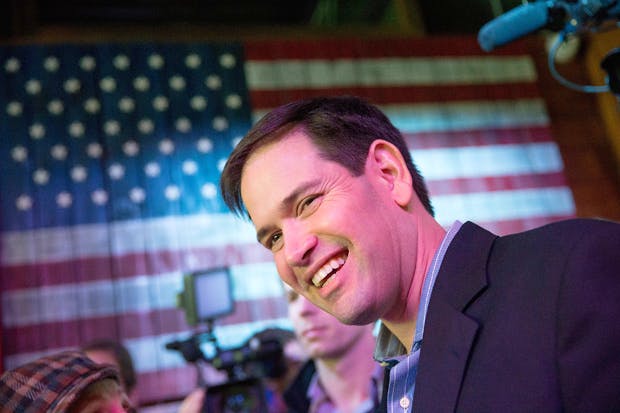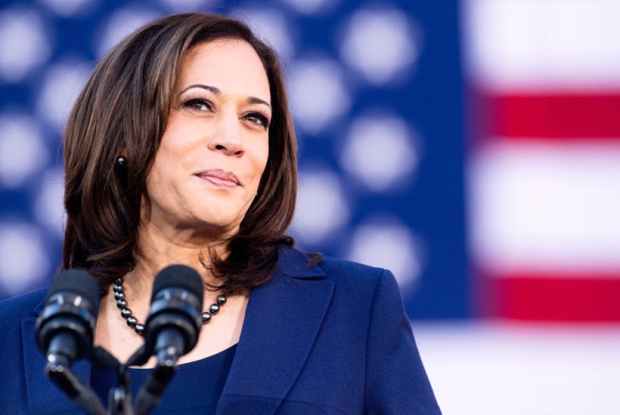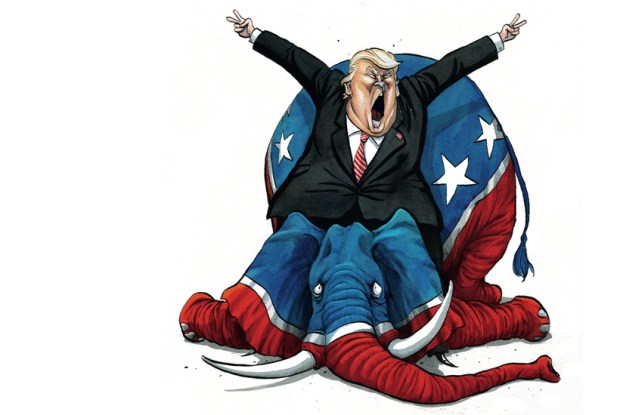Listen
If Donald Trump had won in Iowa on Monday night, everybody would still be saying what a brilliant candidate he is. His decision to shun that Fox News debate, just four days before the caucuses, would be seen as a tactical masterstroke. Looking at his poll lead ahead of the New Hampshire primary next week, journalists would be saying that he had effectively secured the Republican party nomination.
He didn’t win, though. He came second, almost third, and now the narrative about the Trump phenomenon can be turned upside down. Trump’s refusal to abide by the established rules of campaigning was foolhardy. Ducking the debate was a big mistake. The victory of Ted Cruz, the conservative ‘grassroots’ candidate, proved the enduring power of organised politics. And the late surge for Marco Rubio — who surprised everyone by finishing just 1 per cent behind Trump — showed that, despite all the disgruntlement among Republican voters, the party establishment can still come out on top. Trump’s barmy rebellion now looks ready to collapse, and people will ask if the celebrity businessman was ever that serious about becoming president.
Before dismissing Trump’s candidacy, however, it’s worth examining what he has achieved. He won 24 per cent of the vote (against Cruz’s 28 per cent and Rubio’s 23 per cent) in Iowa, a state in which, until a few weeks ago, nobody thought he had a chance. Trump has rather sweetly spent almost $500,000 on ‘Make America Great Again’ baseball hats. He appears to have spent almost nothing on boring but important activities such as canvassing or researching voter preferences, however. He has given his campaign about two-thirds of its $19 million funds (‘It’s not worth it!’ he tweeted this week), but that sum looks piddling compared with the $47 million raised by Cruz or the $112 million behind Hillary Clinton. Still, through the sheer force of his personality, and his media shock value, he almost pulled off a ridiculous victory.
Trump’s campaign may well melt away — just as the Democratic populist Howard Dean’s did in 2004. But bear in mind that Trump had only a seven-point poll advantage before the voting began on Monday. In New Hampshire, where the next vote will take place next week, it is 20 points. And even if the Trump bubble has popped, his campaign has exposed deep cracks in the Republicans’ power structure. Party loyalists and self-described moderates are now flocking to Rubio, who after his strong finish in Iowa looks poised to scoop the nomination. Rubio should now be able to mop up the support of the failing establishment alternatives — Jeb Bush, John Kasich and Chris Christie — and emerge as the pragmatic choice against Ted Cruz, whose hard conservatism frightens the mainstream. In a match-up against Hillary Clinton (the still-presumptive Democratic nominee, just), 44-year-old Rubio polls better than Trump or Cruz.
Rubio is far from an ideal candidate, however. The success of Trump and Cruz suggests that voters are looking for a hard man for tough times. They don’t want a pretty boy who wears high-heeled boots. Rubio, a.k.a. ‘The Republican Obama’, has for years been hyped as the Grand Old Party’s coming saviour, but he has never been as popular with conservative voters as he has with the right-of-centre commentariat. As a devout Catholic (and also an ex-Mormon), he may be sufficiently pious to woo the religious. He’s also aggressive enough in his foreign-policy statements to satisfy those who want to reassert America’s might in the world. But as one of the ‘Gang of Eight’ senators who in 2013 put forward a liberal immigration reform bill, he is mistrusted. Not all Republican voters are preoccupied with keeping out Mexicans and Muslims, yet the fact that Rubio has subsequently ‘flip-flopped’ on his own proposed legislation means he is easily portrayed as lacking principle. Trump was on to something when he called Rubio ‘lightweight’.
Moreover, for all his elite credentials, Rubio has got on the wrong side of a number of senior Republicans, who feel that he has jumped in front of them in the queue. The GOP establishment may be ruthless, but it rewards loyalty. Its last two presidential nominees, Mitt Romney and John McCain, were older men who had served their time. This year, the party intended to elevate Jeb Bush, who had waited so patiently to carry on where his father (the 41st president) and his brother (the 43rd) left off. Trump’s insurgency tore that dynastic plan apart, leaving a path open for Rubio. Rather than accept defeat, however, Bush’s allies turned on the young pretender. They spent millions on television advertisements attacking Rubio as ‘just another Washington politician’. Even when it was painfully obvious that Bush’s campaign was dead, elderly warhorses such as Senator Lindsey Graham pledged fealty to the Bush clan.
After Iowa, the old guard must accept Rubio as their man. But they underrate the significance of Trump and Cruz at their peril. Cruz might be an unattractive figure — he’s a bit like a Texan Gordon Brown — but he is fiercely intelligent. He cleverly cultivated a ‘bromance’ with the poll leader in the last few months of 2015. He let Trump savage lesser opponents. Then, in the last few weeks, he attacked him for being an establishment stooge and a New York liberal.
In the last two presidential election cycles, evangelical Republicans have started brightly, only to be defeated by establishment candidates. But Cruz is more threatening to the existing order than the last two Iowa winners, Mike Huckabee and Rick Santorum.
Cruz represents the increasingly powerful and rich Republican counter-establishment. His coalition is a sprawling yet highly mobilised mass of Tea Party types, conservatives and evangelicals, who are all disillusioned with their party.
Trump’s fans were also angry, albeit less ideologically driven. The question now is whether they will turn to Cruz as the anti-Washington candidate, or hop on the Rubio bandwagon. They might decide that they are better off sticking with The Donald.
Got something to add? Join the discussion and comment below.
Get 10 issues for just $10
Subscribe to The Spectator Australia today for the next 10 magazine issues, plus full online access, for just $10.
Freddy Gray is deputy editor of The Spectator, and was literary editor of the American Conservative in Washington DC from 2008 to 2010.
You might disagree with half of it, but you’ll enjoy reading all of it. Try your first month for free, then just $2 a week for the remainder of your first year.















Comments
Don't miss out
Join the conversation with other Spectator Australia readers. Subscribe to leave a comment.
SUBSCRIBEAlready a subscriber? Log in